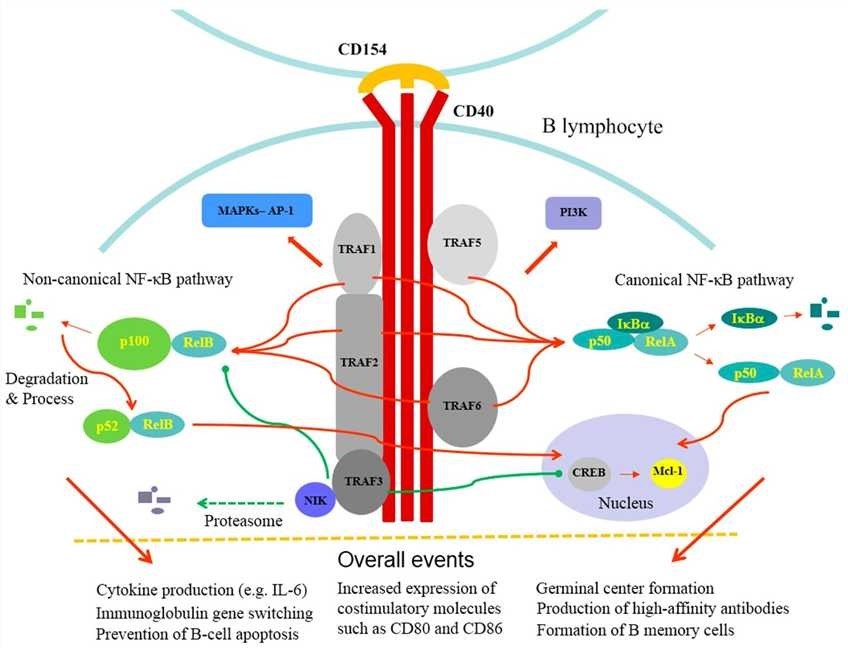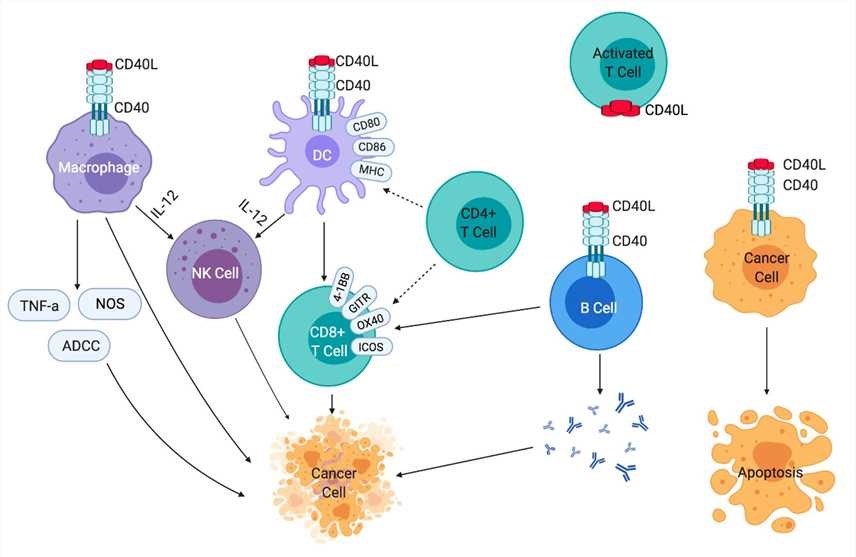CD40, a type I transmembrane glycoprotein with 45-50 kDa, belongs to the tumor necrosis factor (TNF) gene superfamily and behaves as a co-stimulatory molecule. It is widely expressed in antigen-presenting cells (APCs) including B lymphocytes, dendritic cells (DCs), monocytes. CD40 is also expressed on the cell surface of many other normal cells, including endothelial cells, fibroblasts, hematopoietic progenitors, platelets, and basal epithelial cells. CD40L, also called CD154 or gp39, is the physiological ligand of CD40. CD40L is a 39 kDa type II transmembrane protein member of the TNF gene superfamily that exists in soluble (sCD40L) and membrane-bound forms. Compared to the membrane-bound CD40L, the sCD40L shows lower biological activity. CD40L is mainly expressed on activated T cells, B cells, natural killer (NK) cells, platelets, endothelial cells, epithelial cells, and smooth muscle cells.
When CD40 binds with CD40L, it recruits TNF receptor (TNFR)-associated factor1-6 (TRAFs) to its cytoplasmic domains, and TRAF6 appears to be predominant in driving CD40-mediated signaling. TRAFs then recruit TRAF-interacting kinases and together influence a number of well-characterized signal transduction pathways, including the nuclear factor-kappa B (NF-κB), p38/mitogen-activated protein kinase (MAPK), and c-Jun-NH2-kinase (JNK) pathways. The activation of the CD40L-CD40 axis results in several events, including cytokine production, immunoglobulin gene switching, prevention of B-cell apoptosis, increased expression of costimulatory molecules such as CD80 and CD86, germinal center formation, production of high-affinity antibodies, and formation of B memory cells.
 Fig.1 CD40-mediated signaling pathways and events. (Lai, 2019)
Fig.1 CD40-mediated signaling pathways and events. (Lai, 2019)
APCs express CD40 to contribute to T cell activation. CD40 ligation of resting B cells increases antigen-presenting function and, in addition, induces proliferation, immunoglobulin class switching, and antibody production. CD40-CD40L binding on macrophages results in the production of TNF-α, nitric oxide synthase, and antibody-dependent cellular cytotoxicity (ADCC). CD40-CD40L binding on DCs and macrophages results in the secretion of interleukin 12 (IL-12), which is important for T cell and NK cell-mediated antitumor effects. Additional functions mediated by CD40/CD40L interactions include induction of apoptosis in CD4+ T cells and generation of CD8+ T cell memory. Furthermore, CD40 can also be expressed on tumor cells themselves and its ligation there can result in apoptosis or growth impairment as another potential antitumor mechanism.
 Fig.2 Effects of CD40-CD40L signaling on immune cells and cancer cells. (Djureinovic, 2021)
Fig.2 Effects of CD40-CD40L signaling on immune cells and cancer cells. (Djureinovic, 2021)
CD40 is also widely expressed on various types of malignant tumors, including bladder, breast, and ovarian carcinoma cells, as well as melanoma cells. CD40 expression was demonstrated to be associated with tumor progression and poor prognosis. CD40 expression has been reported to be a negative prognostic factor. For example, CD40 was originally identified as a surface marker on bladder carcinoma cells and B cells. CD40 is a prognostic marker in primary cutaneous malignant melanoma. The expression of CD40 on human lung cancer correlates with metastatic spread and may serve as a prognostic marker. However, the biological role of CD40 on tumor cells in most malignant progression and the tumor microenvironment remains unclear.
Although it has been reported that some tumor cells express CD40, the biological implications of CD40 expression on most tumor cells remain unclear. Moreover, activation of CD40 affects multiple immune cells, providing the promise of harnessing CD40 as a therapeutic target in cancer. Creative Biolabs provides one-stop CD40 assay portfolio services for research, including but not limited to
Creative Biolabs, a globally oriented biotech company, is specialized in in-vitro and in vivo technologies. We provide a broad portfolio of tumor marker assay services. We also develop and offer a wide variety of products including some assay kits, antibodies, and other innovative research products. Please feel free to contact us.
For Research Use Only | Not For Clinical Use